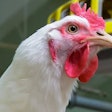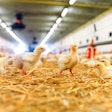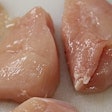
With a considerable degree of uncertainty, a recent assessment puts the risk of highly pathogenic avian influenza (HPAI) in European poultry at moderate for the coming season. Recent weeks have seen a tailing off in cases in commercial and captive birds, while the H5N1 virus variant continues to be detected at low levels in wild species.
In its latest assessment, the agriculture department of Northern Ireland, DAERA reports that the risk of HPAI outbreaks in poultry for the coming winter is "moderate." This is based on the recent and imminent arrival of wild birds from areas of known infection. Exacerbating the situation is an unusually high number of cases in wild birds during the summer — in both resident species and summer visitors — as well as weather conditions likely to be more favorable to virus survival.
As a result, DAERA is warning Northern Ireland’s poultry owners to be alert for signs of disease in their birds. Furthermore, the department stresses the importance of consistently maintaining high biosecurity around all domestic flocks.
Other options for disease control in poultry are limited until an effective vaccine is authorized and becomes available on the market.
Recently, the Dutch government announced that field trials have begun on potential vaccine candidates. However, the testing phase alone is likely to last for two years, and so biosecurity will remain the mainstay of HPAI control in the foreseeable future.
Disease situation stable in Europe’s domestic birds
Since the start of 2023, there have been 385 outbreaks of HPAI in commercial poultry in 21 European Union (EU) member states and neighboring countries. This is according to the Animal Disease Information System by the European Commission (EC; dated September 22). The totals are unchanged from the previous update to September 8.
This source includes two regions not belonging to the continent of Europe. Totals include two outbreaks in Turkey (Tűrkiye) as well as one in the French overseas territory of Reunion, located in the western Indian Ocean.
No new outbreaks in commercial birds have been reported to the agency since July 27. Of the EC’s total, the country with the most outbreaks — now with 152 — is France. Next come Hungary with 79 outbreaks to date.
For comparison, 24 nations registered a total of 2,321 outbreaks in poultry through this system during 2022.
Among captive birds, 13 countries have together registered a total of 87 outbreaks of HPAI in captive birds through the EC’s system (to September 22). This category covers backyard poultry, zoos and similar premises.
Although the situation in this group had not changed since July 10, one outbreak has now been confirmed this month in Slovenia.
Recording the most outbreaks in this category has been France (with a total of 30), followed by Germany (29), and Belgium (11). Each of the other 10 nations in the regions has registered between and four outbreaks.
The EC System does not publish information on the HPAI situation in the United Kingdom (U.K.; with the exception on Northern Ireland).
However, earlier this month, two outbreaks linked to the H5N1 serotype of the HPAI virus occurred in Scotland. Affected were flocks of eight and 18 chickens in non-commercial flocks on the Shetland Islands and Isle of Lewis, respectively, according to notifications to the World Organisation for Animal Health (WOAH).
Earlier this week, a further outbreak linked to the H5N1 virus serotype was confirmed in poultry on the Isle of Lewis by the Scottish government.
Further HPAI in wild species in Europe
Over the period September 8-22, 11 European states notified the EC about one or more cases of HPAI in their respective wild bird populations.
Up to the latter date, a total of 3,292 outbreaks had been registered in 27 states of the EU member and adjacent states, according to the EC System.
For comparison, the totals for calendar year 2022 were 33 nations, and 3,245 outbreaks.
In 2023, Germany continues to be the state with the most outbreaks (1,059 for the year to date), followed by France (403), and the Netherlands (375). These nations registered a few new cases with the EC since the previous report update dated September 8, along with Belgium, Denmark, Finland, the Republic of Ireland, Northern Ireland, Norway, Slovenia, and Sweden.
To WOAH, the authority in the U.K. has recorded one further infection in a wild bird.
View our continuing coverage of the global avian influenza situation.
















